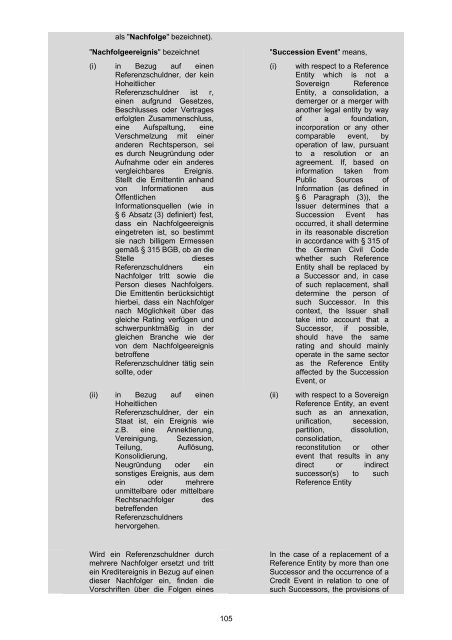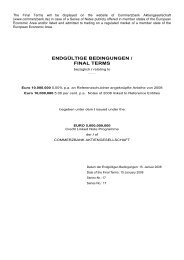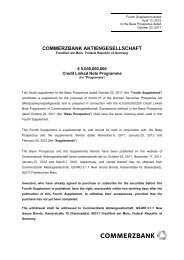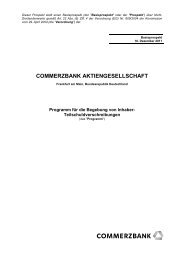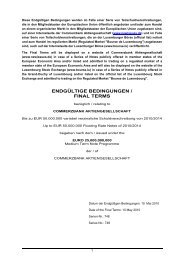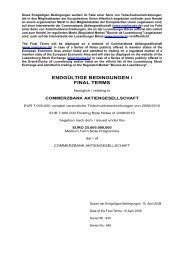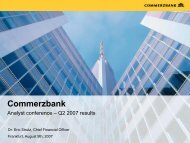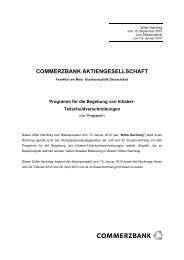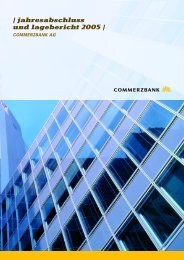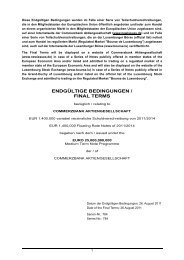COMMERZBANK AKTIENGESELLSCHAFT
COMMERZBANK AKTIENGESELLSCHAFT
COMMERZBANK AKTIENGESELLSCHAFT
You also want an ePaper? Increase the reach of your titles
YUMPU automatically turns print PDFs into web optimized ePapers that Google loves.
als "Nachfolge" bezeichnet).<br />
"Nachfolgeereignis" bezeichnet<br />
(i) in Bezug auf einen<br />
Referenzschuldner, der kein<br />
Hoheitlicher<br />
Referenzschuldner ist r,<br />
einen aufgrund Gesetzes,<br />
Beschlusses oder Vertrages<br />
erfolgten Zusammenschluss,<br />
eine Aufspaltung, eine<br />
Verschmelzung mit einer<br />
anderen Rechtsperson, sei<br />
es durch Neugründung oder<br />
Aufnahme oder ein anderes<br />
vergleichbares Ereignis.<br />
Stellt die Emittentin anhand<br />
von Informationen aus<br />
Öffentlichen<br />
Informationsquellen (wie in<br />
§ 6 Absatz (3) definiert) fest,<br />
dass ein Nachfolgeereignis<br />
eingetreten ist, so bestimmt<br />
sie nach billigem Ermessen<br />
gemäß § 315 BGB, ob an die<br />
Stelle dieses<br />
Referenzschuldners ein<br />
Nachfolger tritt sowie die<br />
Person dieses Nachfolgers.<br />
Die Emittentin berücksichtigt<br />
hierbei, dass ein Nachfolger<br />
nach Möglichkeit über das<br />
gleiche Rating verfügen und<br />
schwerpunktmäßig in der<br />
gleichen Branche wie der<br />
von dem Nachfolgeereignis<br />
betroffene<br />
Referenzschuldner tätig sein<br />
sollte, oder<br />
(ii) in Bezug auf einen<br />
Hoheitlichen<br />
Referenzschuldner, der ein<br />
Staat ist, ein Ereignis wie<br />
z.B. eine Annektierung,<br />
Vereinigung, Sezession,<br />
Teilung, Auflösung,<br />
Konsolidierung,<br />
Neugründung oder ein<br />
sonstiges Ereignis, aus dem<br />
ein oder mehrere<br />
unmittelbare oder mittelbare<br />
Rechtsnachfolger des<br />
betreffenden<br />
Referenzschuldners<br />
hervorgehen.<br />
Wird ein Referenzschuldner durch<br />
mehrere Nachfolger ersetzt und tritt<br />
ein Kreditereignis in Bezug auf einen<br />
dieser Nachfolger ein, finden die<br />
Vorschriften über die Folgen eines<br />
105<br />
"Succession Event" means,<br />
(i) with respect to a Reference<br />
Entity which is not a<br />
Sovereign Reference<br />
Entity, a consolidation, a<br />
demerger or a merger with<br />
another legal entity by way<br />
of a foundation,<br />
incorporation or any other<br />
comparable event, by<br />
operation of law, pursuant<br />
to a resolution or an<br />
agreement. If, based on<br />
information taken from<br />
Public Sources of<br />
Information (as defined in<br />
§ 6 Paragraph (3)), the<br />
Issuer determines that a<br />
Succession Event has<br />
occurred, it shall determine<br />
in its reasonable discretion<br />
in accordance with § 315 of<br />
the German Civil Code<br />
whether such Reference<br />
Entity shall be replaced by<br />
a Successor and, in case<br />
of such replacement, shall<br />
determine the person of<br />
such Successor. In this<br />
context, the Issuer shall<br />
take into account that a<br />
Successor, if possible,<br />
should have the same<br />
rating and should mainly<br />
operate in the same sector<br />
as the Reference Entity<br />
affected by the Succession<br />
Event, or<br />
(ii) with respect to a Sovereign<br />
Reference Entity, an event<br />
such as an annexation,<br />
unification, secession,<br />
partition, dissolution,<br />
consolidation,<br />
reconstitution or other<br />
event that results in any<br />
direct or indirect<br />
successor(s) to such<br />
Reference Entity<br />
In the case of a replacement of a<br />
Reference Entity by more than one<br />
Successor and the occurrence of a<br />
Credit Event in relation to one of<br />
such Successors, the provisions of


